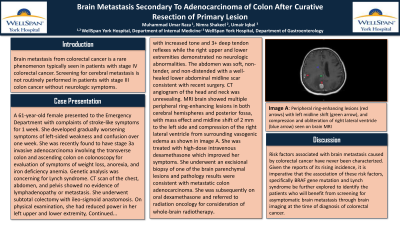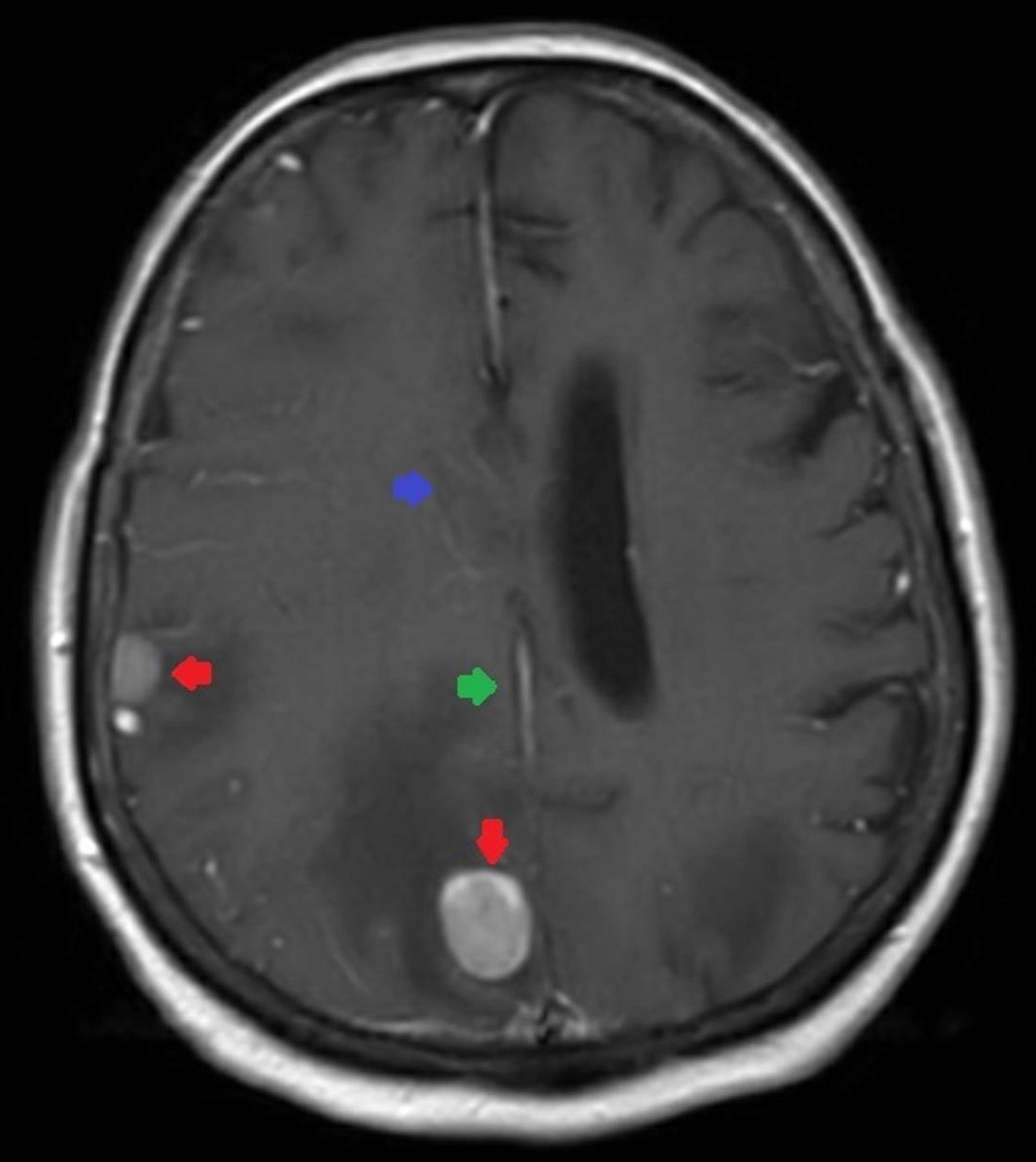Monday Poster Session
Category: Colon
P2043 - Brain Metastasis Secondary to Adenocarcinoma of Colon After Curative Resection of Primary Lesion
Monday, October 28, 2024
10:30 AM - 4:00 PM ET
Location: Exhibit Hall E

Has Audio
- MR
Muhammad Umar Raza, MD
WellSpan Health York Hospital
York, PA
Presenting Author(s)
Muhammad Umar Raza, MD, Nimra Shakeel, MD, Umair Iqbal, MD
WellSpan Health York Hospital, York, PA
Introduction: Brain metastasis from colorectal cancer is a rare phenomenon typically seen in patients with stage IV colorectal cancer. Screening for cerebral metastasis is not routinely performed in patients with stage III colon cancer without neurologic symptoms.
Case Description/Methods: A 61-year-old female presented to the Emergency Department with complaints of stroke-like symptoms for 1 week. She developed gradually worsening symptoms of left-sided weakness and confusion over one week. She was recently found to have stage 3a invasive adenocarcinoma involving the transverse colon and ascending colon on colonoscopy for evaluation of symptoms of weight loss, anorexia, and iron deficiency anemia. Genetic analysis was concerning for Lynch syndrome. CT scan of the chest, abdomen, and pelvis did not show any evidence of lymphadenopathy or metastasis. She underwent subtotal colectomy with ileo-sigmoid anastomosis. On physical examination, she had reduced power in the left upper and lower extremities, with increased tone and 3+ deep tendon reflexes while the right upper and lower extremities demonstrated no neurologic abnormalities. The abdomen was soft, non-tender, and non-distended with a well-healed lower abdominal midline scar consistent with recent surgery. CT angiogram of the head and neck was unrevealing. MRI brain showed multiple peripheral ring-enhancing lesions in both cerebral hemispheres and posterior fossa, with mass effect and midline shift of 2 mm to the left side and compression of the right lateral ventricle from surrounding vasogenic edema as shown in image A. She was treated with high-dose intravenous dexamethasone which improved her symptoms. She underwent an excisional biopsy of one of the brain parenchymal lesions and pathology results were consistent with metastatic colon adenocarcinoma. She was subsequently on oral dexamethasone and referred to radiation oncology for consideration of whole-brain radiotherapy.
Discussion: Risk factors associated with brain metastasis caused by colorectal cancer have never been clearly characterized. Given the reports of its rising incidence, it is imperative that the association of these risk factors, specifically BRAF gene mutation and Lynch syndrome be further explored to identify the patients who will benefit from screening for asymptomatic brain metastasis through brain imaging at the time of diagnosis of colorectal cancer.

Disclosures:
Muhammad Umar Raza, MD, Nimra Shakeel, MD, Umair Iqbal, MD. P2043 - Brain Metastasis Secondary to Adenocarcinoma of Colon After Curative Resection of Primary Lesion, ACG 2024 Annual Scientific Meeting Abstracts. Philadelphia, PA: American College of Gastroenterology.
WellSpan Health York Hospital, York, PA
Introduction: Brain metastasis from colorectal cancer is a rare phenomenon typically seen in patients with stage IV colorectal cancer. Screening for cerebral metastasis is not routinely performed in patients with stage III colon cancer without neurologic symptoms.
Case Description/Methods: A 61-year-old female presented to the Emergency Department with complaints of stroke-like symptoms for 1 week. She developed gradually worsening symptoms of left-sided weakness and confusion over one week. She was recently found to have stage 3a invasive adenocarcinoma involving the transverse colon and ascending colon on colonoscopy for evaluation of symptoms of weight loss, anorexia, and iron deficiency anemia. Genetic analysis was concerning for Lynch syndrome. CT scan of the chest, abdomen, and pelvis did not show any evidence of lymphadenopathy or metastasis. She underwent subtotal colectomy with ileo-sigmoid anastomosis. On physical examination, she had reduced power in the left upper and lower extremities, with increased tone and 3+ deep tendon reflexes while the right upper and lower extremities demonstrated no neurologic abnormalities. The abdomen was soft, non-tender, and non-distended with a well-healed lower abdominal midline scar consistent with recent surgery. CT angiogram of the head and neck was unrevealing. MRI brain showed multiple peripheral ring-enhancing lesions in both cerebral hemispheres and posterior fossa, with mass effect and midline shift of 2 mm to the left side and compression of the right lateral ventricle from surrounding vasogenic edema as shown in image A. She was treated with high-dose intravenous dexamethasone which improved her symptoms. She underwent an excisional biopsy of one of the brain parenchymal lesions and pathology results were consistent with metastatic colon adenocarcinoma. She was subsequently on oral dexamethasone and referred to radiation oncology for consideration of whole-brain radiotherapy.
Discussion: Risk factors associated with brain metastasis caused by colorectal cancer have never been clearly characterized. Given the reports of its rising incidence, it is imperative that the association of these risk factors, specifically BRAF gene mutation and Lynch syndrome be further explored to identify the patients who will benefit from screening for asymptomatic brain metastasis through brain imaging at the time of diagnosis of colorectal cancer.

Figure: Image A: peripheral ring-enhancing lesions (red arrows) with left midline shift (green arrow), and compression and obliteration of right lateral ventricle (blue arrow) seen on brain MRI
Disclosures:
Muhammad Umar Raza indicated no relevant financial relationships.
Nimra Shakeel indicated no relevant financial relationships.
Umair Iqbal indicated no relevant financial relationships.
Muhammad Umar Raza, MD, Nimra Shakeel, MD, Umair Iqbal, MD. P2043 - Brain Metastasis Secondary to Adenocarcinoma of Colon After Curative Resection of Primary Lesion, ACG 2024 Annual Scientific Meeting Abstracts. Philadelphia, PA: American College of Gastroenterology.
